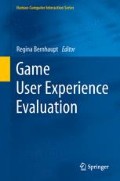Abstract
In order to design new methodologies for evaluating the user experience of video games, it is imperative to initially understand two core issues. Firstly, how are video games developed at present, including components such as processes, timescales and staff roles, and secondly, how do studios design and evaluate the user experience.
This chapter will discuss the video game development process and the practices that studios currently use to achieve the best possible user experience. It will present four case studies from game developers Disney Interactive (Black Rock Studio), Relentless, Zoe Mode, and HandCircus, each detailing their game development process and also how this integrates with the user experience evaluation. The case studies focus on different game genres, platforms, and target user groups, ensuring that this chapter represents a balanced view of current practices in evaluating user experience during the game development process.
Access this chapter
Tax calculation will be finalised at checkout
Purchases are for personal use only
References
Cornett S (2004) The usability of massively multiplayer online roleplaying games: designing for new users. Proceedings of the SIGCHI conference on Human factors in computing systems . ACM, New York, pp 703–710. doi:10.1145/985692.985781
Desurvire H, Wiberg C (2008) Master of the game: assessing approachability in future game design. CHI ’08 Extended Abstracts on Human Factors in Computing Systems
Desurvire H, Caplan M, Toth JA (2004) Using heuristics to evaluate the playability of games. CHI ’04 Extended Abstracts on Human Factors in Computing Systems. doi:10.1145/985921.986102
Dovey J, Kennedy HW (2006) Game cultures: computer games as new media. Open University Press, Maidenhead
Federoff M (2002) Heuristics and guidelines for the creation and evaluation of fun in video games. Indiana University
FUGA (2006) Fun of gaming. http://project.hkkk.fi/fuga/. Accessed 13 Dec 2008
Isbister K (2006) Better game characters by design. Morgan Kauffman
Jørgensen AH (2004) Marrying HCI/usability and computer games: a preliminary look. Proceedings of NordiCHI 2004. doi:10.1145/1028014.1028078
Laitinen S (2006) Do usability expert evaluation and test provide novel and useful data for game development? J Usability Stud 2(1):64–75
Larsen JM (2008) Evaluating user experience—how game reviewers do it. CHI Workshop
Malone T (1981) Heuristics for designing enjoyable user interfaces: lessons from computer games. Proceedings of Conference on Human Factors in Computing Systems, pp 63–68
Mandryk RL (2005) Modeling user emotion in interactive play environments: a fuzzy physiological approach. Ph.D dissertation. Simon Fraser University, Burnaby, Canada
McAllister G, Mirza-Babaei P (2011) Player metrics: using behaviour and biometrics to analyse gameplay. Proceedings of Future and Reality of Gaming (FROG)
Medlock MC, Wixon D, Terrano M, Romero R, Fulton B (2002) Using the RITE Method to improve products: a definition and a case study. Usability Professionals Association. Orlando
Nacke L, Lindley C, Stellmach S (2008) Log who’s playing: psychophysiological game analysis made easy through event logging. Proceedings of 2nd International Conference Fun and Games 2008, Eindhoven, The Netherlands
Newell G (2008) Gabe newell writes for edge. Edge online. http://www.edge-online.com/blogs/gabe-newell-writes-edge. Accessed 27 March 2009
Nielsen J (2005) Heuristics for user interface design. http://www.useit.com/papers/heuristic/heuristic_list.html. Accessed 13 Dec 2008
Schaffer N (2008) Heuristic evaluation of games. In: Isbister K, Schaffer N (eds) Game usability. Morgan Kaufmann, Burlington
Steam (2008) Game and player statistics. http://www.steampowered.com/v/index.php?area=stats. Accessed 13 Dec 2008
Sweetster P, Wyeth P (2005) GameFlow: a model for evaluating player enjoyment in games. ACM Comput Entertain 3(3)
Thompson C (2007) Halo 3: How Microsoft labs invented a new science of play. Wired Magazine 15.09. http://www.wired.com/gaming/virtualworlds/magazine/15-09/ff_halo. Accessed 13 Dec 2008
Acknowledgements
The authors would like to thank interviewees Casper Field, Jason Avent, Martin Newing, Dan Chequer, Karl Fitzhugh and Simon Oliver, and additional feedback from Thaddaeus Frogley.
Author information
Authors and Affiliations
Corresponding author
Editor information
Editors and Affiliations
Rights and permissions
Copyright information
© 2015 Springer International Publishing Switzerland
About this chapter
Cite this chapter
McAllister, G., White, G. (2015). Video Game Development and User Experience. In: Bernhaupt, R. (eds) Game User Experience Evaluation. Human–Computer Interaction Series. Springer, Cham. https://doi.org/10.1007/978-3-319-15985-0_2
Download citation
DOI: https://doi.org/10.1007/978-3-319-15985-0_2
Published:
Publisher Name: Springer, Cham
Print ISBN: 978-3-319-15984-3
Online ISBN: 978-3-319-15985-0
eBook Packages: Computer ScienceComputer Science (R0)

